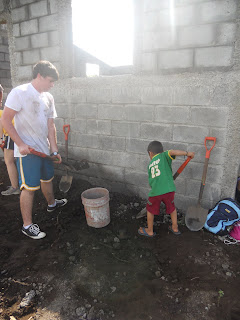
I spent the day in Villa Catalina again. This time, the group was filling in the foundation of a house with material selecto (a mix of rock and sand) which is covered with cement to make a floor. All morning until lunch, we shoveled and filled buckets and dumped buckets full of material selecto into the house.


At lunchtime, a million children came out of the woodwork and were talking to us - even though the most exciting thing we can ask them about, and understand their answers to, is "What grade are you in?" and "Do you like school?" Even though we can barely have a conversation, we are definitely finding other ways of communication.
We met a boy named Jose, who invited us to his house to meet his family. We accepted his invitation, and as we were walking to his house, a little girl, probably about five years old, came right up to me and with no introduction, just took my hand and stayed with us until we had to go back to work. She was so shy - She barely said five words to me and I didn't even get to know her name, but she was content to just hang out with us and sit in our laps and play with our cameras.

The kids here love to take photos with our cameras. They love to have their picture taken as well, but the easiest way to make them ridiculously happy is to let them take pictures of anything and everything they see. They get so excited, and they love candid shots of people with funny expressions and of people taking pictures. They laugh so hard and have such big smiles as they show each other the photos they have taken.

There was a scare in the hospital today: A little boy, just two years old came in for surgery for his club feet, and his parents didn't give a complete medical history. The boy was put under anesthesia, the surgery went perfectly, and then the doctors were not able to extubate. They asked the parents if there was anymore information, and then they found out that the boy had had pneumonia recently, and his lungs were probably not strong enough for anesthesia. So, they sent the boy and one of our doctors to the hospital in Leon, where they have the monitoring equipment and staff that is needed to keep him over night. We are all hoping that he will be alright, but won't know until tomorrow.

















































